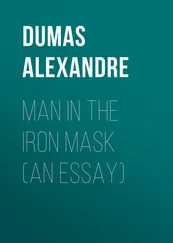George Dover - The True History of the State Prisoner, commonly called the Iron Mask
Здесь есть возможность читать онлайн «George Dover - The True History of the State Prisoner, commonly called the Iron Mask» — ознакомительный отрывок электронной книги совершенно бесплатно, а после прочтения отрывка купить полную версию. В некоторых случаях можно слушать аудио, скачать через торрент в формате fb2 и присутствует краткое содержание. Жанр: foreign_antique, foreign_prose, на английском языке. Описание произведения, (предисловие) а так же отзывы посетителей доступны на портале библиотеки ЛибКат.
- Название:The True History of the State Prisoner, commonly called the Iron Mask
- Автор:
- Жанр:
- Год:неизвестен
- ISBN:нет данных
- Рейтинг книги:5 / 5. Голосов: 1
-
Избранное:Добавить в избранное
- Отзывы:
-
Ваша оценка:
- 100
- 1
- 2
- 3
- 4
- 5
The True History of the State Prisoner, commonly called the Iron Mask: краткое содержание, описание и аннотация
Предлагаем к чтению аннотацию, описание, краткое содержание или предисловие (зависит от того, что написал сам автор книги «The True History of the State Prisoner, commonly called the Iron Mask»). Если вы не нашли необходимую информацию о книге — напишите в комментариях, мы постараемся отыскать её.
The True History of the State Prisoner, commonly called the Iron Mask — читать онлайн ознакомительный отрывок
Ниже представлен текст книги, разбитый по страницам. Система сохранения места последней прочитанной страницы, позволяет с удобством читать онлайн бесплатно книгу «The True History of the State Prisoner, commonly called the Iron Mask», без необходимости каждый раз заново искать на чём Вы остановились. Поставьте закладку, и сможете в любой момент перейти на страницу, на которой закончили чтение.
Интервал:
Закладка:
These are all the particulars, worthy of credit, to be collected respecting Matthioli during his confinement at the Bastille, which lasted rather more than five years. He died there after a few hours’ illness, November 19th, 1703. Dujonca’s journal gives the following account of his decease and interment.
“Monday, 19th November, 1708. The unknown prisoner, who was always masked with a mask of black velvet, whom M. de St. Mars brought with him, when he came from the Islands of St Margaret, and whom he had had the care of for a long time, having found himself rather more unwell when he came out from mass, died to-day, about ten o’clock in the evening, without having had any considerable illness. M. Girault, our chaplain, confessed him yesterday. Death having come suddenly on, he was not able to receive his sacraments, and our chaplain only had time to exhort him for a moment before he died. He was interred on Tuesday the 20th November, at four in the afternoon, in the church-yard of St. Paul, which is our parish. His interment cost forty livres.”
This extract is confirmed in its facts by the register of the Bastille, 149as well as by the register of burials of the church of St. Paul, at Paris. The former document also informs us that he was wrapped in “a winding-sheet of new linen,” 150– and the latter, that he was buried in the presence of Rosarges, Major of the Bastille, and of Reilh, Surgeon-Major of the same prison.
In the register of the church he is designated by the name of Marchialy, and his age is entered as forty-five; assertions which are both of them evidently incorrect, and probably only made in order to mislead the curious. At the time of his death, Matthioli was sixty-three years of age, as appears from the date of his birth before given. Shortly before he died, he told the Apothecary of the Bastille that he believed he was sixty years 151old – a degree of inaccuracy as to his own age, which is easily to be conceived in a man who had been so long and so rigorously imprisoned. His confinement had lasted above twenty-four years.
After the decease of Matthioli, every thing was done to endeavour to destroy all trace even of his former existence. His clothes were burnt, as was all the furniture of his room; the silver plate, the copper, and the pewter, which had been used by him, were melted down; the walls of his chamber were first scraped, and then fresh white-washed; the floor was new paved; the old ceiling was taken away and renewed; the doors and windows were burnt; and every corner was searched in which it was thought any paper, linen, or other memorial of him might be concealed. 152
Thus were continued, to the very last, the same extraordinary precautions against discovery, which marked the whole imprisonment of the mysterious prisoner: a circumstance, which of itself certainly affords a strong confirmation of the fact, that the Iron Mask of the Bastille , was one and the same person with the Count Matthioli , who had been so secretly introduced into Pignerol, and so mysteriously conveyed from place to place by St. Mars. But the actual proof of this is only to be found in the documents which form the groundwork of the preceding narrative; and which, undoubtedly, do present a most convincing and satisfactory chain of evidence upon the subject.
An important corroboration of this evidence is also derived from the well-attested fact, that Lewis the Fifteenth, who is allowed, on all hands, to have known the history of the Iron Mask, affirmed, more than once, that he was the minister of an Italian sovereign . He told the Duke de Choiseul, 153on one occasion, that he knew who the Iron Mask was; and, upon the Duke’s questioning him further, would only add, that all the conjectures hitherto made upon the subject were erroneous . 154The Duke then begged Madame de Pompadour 155to ask the King who it was; she did so, and his reply was, “ The minister of an Italian prince! ” 156The Duke de Choiseul, unsatisfied by this reply, which he considered to be only an evasion, took another opportunity of again applying to the King upon the subject, who again answered, “ He believed that the prisoner was a minister of one of the courts of Italy! ” 157
Thus has the ill-fated Matthioli been identified with the Iron Mask, and traced through his long and dreary prison to his grave. It is probable that much of the illusion and interest, which accompanied the mysterious appellation of the Iron Mask , will be destroyed by the certainty of who he really was; as well as by the comparative insignificance of the personage who has successfully laid claim to the title. Still it is surely satisfactory that truth, after being so long overwhelmed by error, should be at length triumphant.
The lovers of romance, who still wish to know more of the magnificent conjectures of former days; or who desire to be made acquainted with the reasons that induced a belief, that the Iron Mask was either the Duke de Beaufort; or the Count de Vermandois; or the Duke of Monmouth; or an elder or a twin-brother of Lewis the Fourteenth; or a son of Oliver Cromwell; or Arwediks, the Armenian Patriarch; are referred to Voltaire, Dutens, St. Foix, La Grange Chancel, Gibbon, the Père Papon, the Père Griffet, the Chevalier de Taulés, and Mr. Quintin Craufurd. Of these accounts, perhaps Voltaire’s is the least curious, find Mr. Craufurd’s the most so; because the first did not seek for truth, but only wished to invent a moving tale; while the latter was most anxious to arrive at the truth, and had all the advantage in his researches of the former writers upon the same subject.
APPENDIX
No. 1
ESTRADES TO LEWIS THE FOURTEENTH
Commencement of the Negociation. – State of the Court of Mantua. – Influence of the Spaniards there.
Venice, Dec 18th, 1677.Sire,
As the grief I felt at having displeased your Majesty was extreme, so my joy is not less to learn from M. de Pomponne, that your Majesty has had the goodness to pardon me my too great facility; and that you have been graciously pleased to listen to the reasons, which I took the liberty to offer to you, in justification of the innocence of my intentions; however, Sire, this misfortune will oblige me, in future, to act in all things with so great a circumspection, that your Majesty will, I hope, never have cause to be dissatisfied with my conduct.
I have thus far deferred informing your Majesty of a project, which my anxiety for your service has suggested to me, because the success of it appeared so difficult that I did not venture to propose it, till I saw some chance of being able to accomplish it; but, as the affair is at present in a favourable state, I can almost assure your Majesty, that the conclusion of it will depend upon yourself. I shall now give you an exact account of it, in order that I may receive the orders it shall please you to send me; which I will take care to execute punctually. About four months ago, having become more particularly acquainted with the divisions at the Court at Mantua than before was the case, and having heard that the Duke of Mantua was not so abandoned to his pleasures, but that he still had some ambition, and much chagrin at the state to which he was reduced by his mother, and his suspicions of the Spaniards; I hoped that it would not be impossible, to detach him entirely from them, to induce him to enter into the views of your Majesty, and to persuade him really to treat respecting Casale. I have thought that I could not employ any one in this affair more proper to conduct it, than a certain Count Matthioli, who is entirely devoted to that prince; I had already known him for some time, and he had testified a great desire of rendering himself agreeable to your Majesty by some service. I knew that he had been Secretary of State to the late Duke of Mantua, that the present one had preserved much affection for him, and that he was well-informed of the different interests of the Princes of Italy; but as he had been much in the Milanese, and had had a good deal of access to the Spanish ministers, I would not put any confidence in him, till I had first tried him. I therefore charged the individual, named Giuliani, to whom your Majesty had the goodness to make six months ago a gratification, and who has a zeal for your service which prevents my having any doubt of his fidelity, to observe Matthioli attentively and secretly; and after I had been sufficiently informed that he was much discontented with the Spaniards, who had always amused him with hopes, and afterwards abandoned him, I sent Giuliani, in the month of last October, to Verona, where he went under pretext of his private affairs; but in fact, to put Matthioli, who was there, upon the subject of the Duke of Mantua, according to the instruction I had given him, and to represent to him that those who had an attachment for their prince, could not but be much afflicted to see him, at his age, still under the guidance of his mother; without money, without authority, always in a state of suspicion against those who are habitually about him; and what is worse, in so insensible a state, that he only thought of passing his life with actresses and women of the town; which had made him lose the esteem of every body, and the consideration which his rank ought to have given him: that so strange a way of life, as well as the opinion that was prevalent that he would never have children by his wife, though she was as young as himself, induced the Spaniards to foment the divisions that existed in this Court, in order to profit by them, and to try and obtain possession of Casale and of all the Montferrat; that the said Giuliani had heard me say, that I was well-informed that the Empress Eleanor had already declared her pretensions to put herself in possession of that part of the territories of Mantua; that the king of Spain supported strongly those of a Spanish nobleman, who, in virtue of his marriage with the niece of the Duke of Guastalla, by whom he has children, maintains that he is the sole heir of that duke, to the prejudice of the Duke of Mantua, who has married his daughter, and who is besides his nearest relation; that, on the other hand, the absolute control over all the territories of this prince, and all the revenues, were in the hands of his mother and of the monk Bulgarini; that, of all those who serve him as ministers, some are gained by the Spaniards, others by the Empress Eleanor, and the rest by the Duke of Guastalla; that his mother has also a part of them on her side, but that these are the smallest number, and in short, that it is a sort of miracle that he has not been already deprived of his territories, but that he runs the risk of it every day, and that the misfortune may happen to him when he is the least prepared for it; that he has no choice of the means to be made use of to guarantee himself against it, but that it is the protection of your Majesty which is alone able to give him complete security. Matthioli replied to him, that all he had been saying to him was quite true, and that he had long, with grief, seen the truth of it; but that there was still a remedy for so great an evil; that he was sufficiently acquainted with the Duke of Mantua to know that he had more talent and ambition than he was thought to have; that, if I approved of it, he would discover his real sentiments, and that he would charge himself with whatever negociation I wished. That, meanwhile, he would go to — 158, in order to be nearer to Mantua, where he could not go without making himself suspected by the different parties who governed there, and that there he would wait till I made known to him my intentions. Some days afterwards, he sent me word that he had found means to have a secret interview with the Duke of Mantua; and that he wished me, in order that we might act in concert, to send him Giuliani, whom I have always made use of in the different journeys that were to be made, because his employment of sending the news through the different parts of Italy, gave him occasion to go from one town to another, and prevented any suspicion of him, as there would have infallibly been, if I had sent any one of my household. I despatched him, therefore, with a new instruction, and not only had he an audience of the Duke of Mantua, to whom he spoke as I had desired him, but this prince even approved very much of the proposition that was made him, to deliver him from the continual inquietudes caused him by the Spaniards, and that, for this purpose, Casale should be put into your Majesty’s hands, with the understanding that I should try to obtain from you in his favour all that he could reasonably ask for. Finally, he declared that his resolution was taken upon this subject, but, that things might be better adjusted, he wished to communicate it to two of his counsellors, in whom he had the most confidence, and that he gave the selection of them to Matthioli, in order that he might be quite secure of them. Matthioli named the Marquis Cavriani and Joseph Varano, in whom he has confidence. Meanwhile the Duke of Mantua sent Giuliani to me, to acquaint me with what had passed, and recommended him to return as soon as possible, in order to receive the draft of the plan, which would then be prepared – and to convey it to me. I was much pleased, Sire, to see the affair in so good a train. I sent Giuliani back quickly, and ordered him to tell the Duke of Mantua that I entreated him to allow me to have a conference with him; that your Majesty had not as yet any knowledge of the proposed treaty, because I could not venture to go so far as that, without being certain first that he would not disavow me in what I should have the honour of writing to your Majesty, and also that he would have sufficient power to execute what had been arranged.
Читать дальшеИнтервал:
Закладка:
Похожие книги на «The True History of the State Prisoner, commonly called the Iron Mask»
Представляем Вашему вниманию похожие книги на «The True History of the State Prisoner, commonly called the Iron Mask» списком для выбора. Мы отобрали схожую по названию и смыслу литературу в надежде предоставить читателям больше вариантов отыскать новые, интересные, ещё непрочитанные произведения.
Обсуждение, отзывы о книге «The True History of the State Prisoner, commonly called the Iron Mask» и просто собственные мнения читателей. Оставьте ваши комментарии, напишите, что Вы думаете о произведении, его смысле или главных героях. Укажите что конкретно понравилось, а что нет, и почему Вы так считаете.












